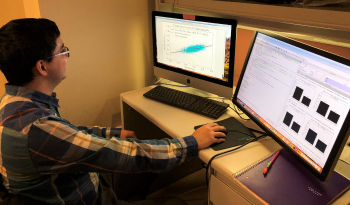Epilepsy Research
Researching Epilepsy at BIDMC

While the focus of our clinical program is on improving the lives of individuals affected by epilepsy who come through our doors, our broader mission includes helping all epilepsy patients, even those we will never meet, now and in the future. One of the main ways we do this is through research. At BIDMC we maintain an active research program that works to expand our understanding of epilepsy, its causes, its consequences, and its treatments. We believe in a goal of “no seizures, no side effects” and we seek to explore and discover new therapies and, ultimately, a cure. At the same time, we are committed to using research not only to push the boundaries of our current knowledge but also to ensure that scientific advances and high-quality care are made available to as many patients as possible, including those who historically have had inadequate access to care.
The history of the BIDMC epilepsy program is grounded in a number of research “firsts” in the field, particularly in neuroimaging, antiepileptic drug trials, and EEG technology. Currently our research portfolio comprises several broad areas:
- basic and translational science, aimed at understanding the underlying causes of epilepsy
- clinical research, including neuroimaging studies, neurophysiology, and trials of new drugs and devices
- technology and innovation, including high-density EEG and noninvasive brain stimulation
- computational research, using large datasets to investigate natural seizure patterns
- outcomes and quality research, exemplified by our leadership in national consortia and networks
Open Research Studies
The following are examples of research studies for which we are currently seeking participants. For more information, please email our Epilepsy Research Team.
- Multicenter 1-year observational study of patients who are initiating brivaracetam
- Prospective randomized 12-week controlled study of visual field change in subjects with partial seizures receiving pregabalin or placebo
- Evaluation of cortical excitability and excitation/inhibition balance in patients with a new diagnosis of epilepsy starting antiepileptic drugs
- Depot medroxyprogesterone acetate (DMPA) use in women with and without epilepsy: a pilot study of serum MPA levels
- Measuring and modifying cortical hyperexcitability in patients with progressive multifocal leukoencephalopathy
- Cathodal transcranial direct current stimulation (tDCS) for treatment of medically refractory focal epilepsy
